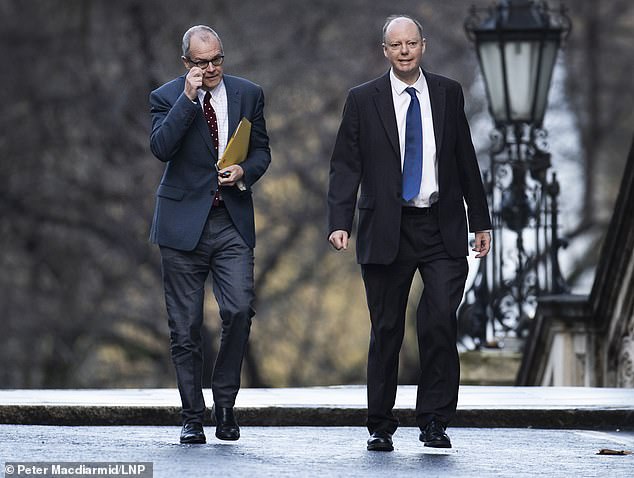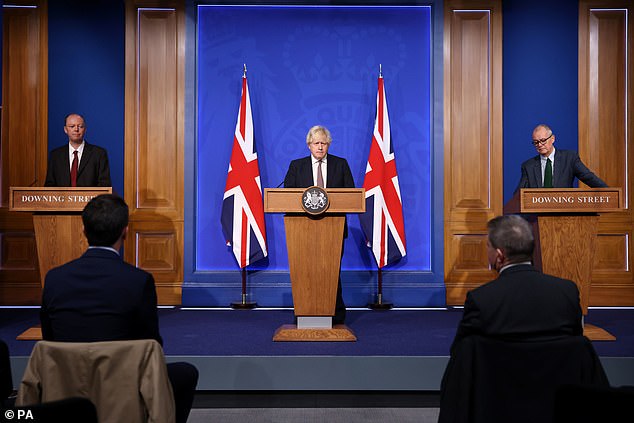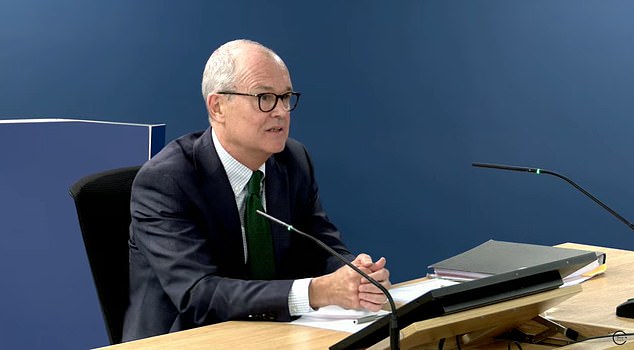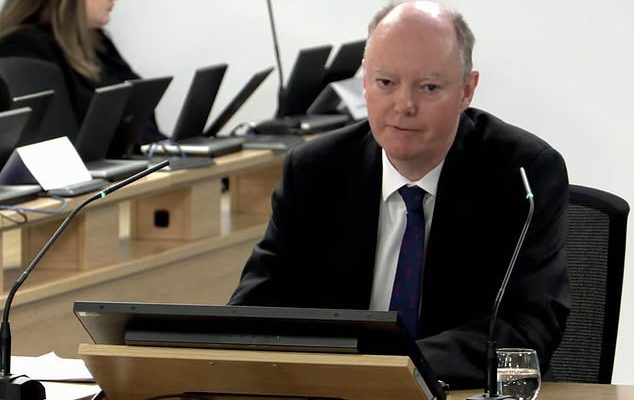Sir Chris Whitty has denied having a feud with Sir Patrick Vallance over whether Covid restrictions should have been brought in earlier.
England’s Chief Medical Officer told the Covid Inquiry that there was a ‘very small’ difference between the pair in early 2020, as he was more worried about the knock-on effects of measures to curb the spread of the virus.
He was most worried about those who live in the poorest areas of the country and alone seeing their physical and mental health dwindle due to stay-at-home orders.
But Sir Patrick, the Government’s former Chief Scientific Adviser, yesterday said he ‘didn’t have exactly the same worry’ and instead thought ‘we need to move on this’.
However, Sir Chris said claims of a friction between the two experts — initially laid bare in a book by another top scientist — were included to make it ‘more exciting’.
England’s Chief Medical Officer (pictured today) told the Covid Inquiry that there was a ‘very small’ difference between the pair in early 2020, as he was more worried about the knock-on effects of measures to curb the spread of the virus

But Sir Patrick (left), the Government’s former Chief Scientific Adviser, yesterday said he ‘didn’t have exactly the same worry’ and instead thought ‘we need to move on this’. However, Sir Chris (right) said claims of a friction between the two experts — initially laid bare in a book by another top scientist — were included to make it ‘more exciting’
Inquiry counsel Hugo Keith pointed to the book written by Sir Jeremy Farrar, an influential member of SAGE, titled Spike: The Virus v the People.
He noted a section where Sir Jeremy wrote that there was a friction between ‘waiting and wading in’ between Sir Chris and Sir Patrick in January and February 2020.
Asked whether there was a ‘degree of difference’ between the pair, Sir Chris said: ‘Sir Jeremy, who is a good friend and colleague, had book to sell.
‘And that made it more exciting, I’m told.
‘My own view was that actually the differences were extremely small.’
Sir Chris said the ‘main’ difference was that he highlighted some of the ‘very significant problems’ that would be triggered by lockdowns and thought these should be made clear to ministers.
He said: ‘I think that was an appropriate thing for me to do. Sir Patrick also thought it was appropriate. Inevitably, it meant that we appeared that we had slightly different starting points in Sage.
‘But then end product was the Sage view and we reflected the Sage view when we went to ministers, which was in my view the correct way to do it.’
Mr Keith said that Sir Chris wrote in his witness statement that there are risks to ‘over-calling’ a pandemic — such as leading to multiple false alarms.
He also noted that Sir Patrick wrote in his diaries that Sir Chris had a tendency to be ‘perhaps more cautious’ and wanted to wait to see how things pan out.
Mr Keith asked whether that put him in contrast to Sir Patrick.
In a tense exchange with Mr Keith, who asked whether Sir Chris was therefore at odds with Sir Patrick, the Chief Medical Officer said he had set out the downsides of locking down but argued that was not the same as saying it should not happen.
Sir Chris said: ‘I think we should be very careful of the narcissism of small differences here.
‘The differences were small.
‘I did have a stronger concern, I would say than some, that the biggest impact of everything we did — and I was confident we were going to have to do them, to be clear — that when we started, the disadvantages of all the actions, not just full lockdown, but other actions before that such as cocooning, then shielding, as an example, stopping schooling is another, the biggest impact would be areas of deprivation and those living alone.
‘I was very aware that we essentially had two different things we were trying to balance.
‘The risk of going too early — in which case you get all the damages from this with actually fairly minimal impact on the epidemic — and risk too late — in which case you get all the problems of the pandemic running away.
‘As we will I’m sure come on to, my view is, with benefit of hindsight, that we went a bit too late on first wave. I’ve been very clear about that for some time.
‘But the idea that there was not some tension between those two and you could somehow go without cost, earlier than was needed, I think was incorrect.
‘Again, everyone around the Sage table would have agreed with that position.
‘The degree of weighting, between those two inevitably varied a bit between people and I was probably further towards ‘lets think through disadvantages here before we act’ and also in making sure in giving my advice that ministers were aware of both sides of the equation.’
Sir Chris Whitty said that when he warned former Prime Minister Boris Johnson that ‘overreacting’ to the spread of the virus would have an ‘impact’ in March 2020, this was the position of the Sage group of experts.

Asked whether that put him in contrast to Sir Patrick (right), Sir Chris (left) said: ‘I think we should be very careful of the narcissism of small differences here. The differences were small’
Mr Keith asked Sir Chris whether he was ‘more cautious than others in wanting to wait to see how things could eventuate?’
In a heated reply, Sir Chris said: ‘I’ve rejected and I will continue to reject your characterisation of this as ‘overreaction’, because that implies that I thought that in a sense the action should not happen.
‘What I thought should happen is that people should be aware that without action very serious things would occur but the downsides of those actions should be made transparent.
‘I don’t consider that incorrect.
‘Sir Patrick was, in a sense, saying exactly that, that the advice we gave was identical. But the debate we had about this was how do we actually get the balance of these clearly in front of people and that’s an appropriate thing to do.’
It comes after Sir Patrick yesterday told the inquiry that Sir Chris’ role as a public health specialist meant he was ‘rightly concerned’ about the adverse effects of Covid restrictions, such as harming mental health.
The CMO argued that these factors should be considered and ‘pulling the trigger to do things too early could lead to adverse consequences’, according to Sir Patrick.
While Sir Patrick said this was a ‘totally appropriate worry’, he said: ‘I didn’t have exactly the same worry. I was more on the side of we need to move on this, but I think that’s partly why the two of us found it useful to work together.
‘I mean, he would bring in views that were broad public health views looking at the consequences of interventions, as well as the direct consequence of the virus.
‘And I think sometimes I would want to push and he might not, and sometimes he was right and sometimes I think we should have gone earlier. This was an occasion when I think it’s clear that we should have gone earlier.’
Asked today whether there should have been more focus on reducing Covid deaths than considering the knock-on effects of lockdown, Sir Chris said: ‘One of the problems with that argument is up to and including the beginning of March, we didn’t have any mortality in the UK, we’d only just had evidence of internal transmission.’
He added: To make this clearer, if as doctor you only say to someone, you need an operation and you don’t lay out to them all the things that could potentially go wrong with this operation, even if you think, personally it’s the right thing to do, you’d be failing in your medical role.
‘If came to a court there would be firm direction on that from the legal profession. So it is important, when giving advice, you give advice on both sides of the equation.’
He added: ‘One of the problems I had in thinking this through, was I think some people were thinking that this was just a matter of getting through a few weeks and then we’re out and it’s all fine.
‘My view is that you had to think about this over the course of the epidemic as whole, and that was clearly going to go on for much longer.’
The UK was plunged into lockdown on March 26, 2020.
It saw schools, shops and hospitality close, social distancing come into force and Brits only allowed to exercise outdoors once a day.
Experts largely accepted that the economically-crippling measures were vital to control the spread of the virus, as there was no vaccine yet available to prevent severe illness and stunt hospital admissions.
But other epidemiologists and public health scientists shared ‘grave concerns’ about the collateral damages of such policies on the NHS and society.
Sir Chris wrote in his witness statement that the ‘absence of contemplation’ of lockdown by scientists earlier ‘might be considered a failure of imagination’ as experts ‘understood the nature of epidemics and their history’.
Asked by inquiry counsel Hugo Keith what the reference meant, he said that within Sage he was ‘one of the people who was most concerned’ that the ‘reality’ of past pandemics was captured.
In further revelations, the inquiry also heard that allowing mass gatherings in early 2020 was ‘illogically incoherent’.
It also signalled to the public that the Government was not taking the threat Covid posed seriously enough, Sir Chris argued.
On March 7, 2020 the prime minister attended Twickenham to watch England play Wales, shaking hands with England captain Owen Farrell.
The following week the Cheltenham horse racing festival was allowed to go ahead with 250,000 fans.

It comes as Sir Patrick Vallance yesterday told the inquiry that Sir Chris’ role as a public health specialist meant he was ‘rightly concerned’ about the adverse effects of Covid restrictions, such as harming mental health. The CMO argued that these factors should be considered and ‘pulling the trigger to do things too early could lead to adverse consequences’, according to Sir Patrick
And that same week, thousands of Atletico Madrid fans flew into Liverpool to watch their team play in the Champions League when lockdown rules would have stopped them watching a game in Spain.
The government has always defended letting those events go ahead — saying the scientific advice from Sage supported its decision.
But Sir Chris told the probe: ‘What we really were not paying enough attention to, and it is sort of obvious with hindsight, is the message this was sending — that seeing mass gatherings going on, signalled to the general public that the Government couldn’t be that worried because, if it was, it would be closing the mass gatherings.
‘I think the problem was not the gatherings themselves, which I don’t think there is good evidence that they had a material effect directly, but the impression it gives of normality at a time when what you are trying to signal is anything but normality.
‘So I think were we to rerun, I think that’s one I would certainly do differently, or push to do differently.’
The Government would have also paid far more attention to the risks posed by Covid if it was a terrorist or geopolitical threat, rather than a natural threat, he also claimed today.
There was an ‘opportunity where we could probably have moved up a gear or two across Government’ in early February 2020 if the system had been ‘electrified’ by the information it already had on Covid, he said.
Agreeing with Mr Keith that there was a ‘systemic failure’, he argued that if MI5 had warned that 100,000 people could die in a terrorist attack, the chance the system would have carried on as it did would have been ‘quite small’.
‘The system is surprisingly bad, in my view, at responding to threats of this kind which are not in the national security system’, he said.
‘Hard geopolitical threats are treated in a different way’ to natural threats, he added.
Earlier, Sir Chris also told the inquiry that the way Mr Johnson made decisions during the pandemic was ‘unique’ and he had a ‘distinct’ style.
But he admitted that the UK’s flu pandemic plans were not ‘useful’ at all and ‘woefully deficient’ for the Covid pandemic and a new plan needed to be made from scratch.
Neither he nor Sir Patrick also ever told ministers which decisions ‘must’ be taken, he said.
He did, however, defend the decision to allow former no 10 senior adviser Dominic Cummings to attend Sage meetings, despite the ‘row’ this caused.
‘When it was known that Mr Cummings himself sometimes came to Sage, this caused quite a row actually, I wasn’t the person who made the decision to make that possible,’ he said.
But he suggested Mr Cummings did not try to influence discussions or conclusions of the meetings, adding: ‘I thought it was perfectly sensible that if one of the most senior advisers to the Prime Minister, if she or he wished to, could listen in on Sage, struck me as a sensible thing to do.’
In further revelations the inquiry also heard that the pandemic mantra of ‘following the science’, however, became a ‘millstone’ round Sir Chris’ neck.
He told the probe: ‘Both (Sir) Patrick (Vallance) and I, when it initially happened – remembering that our job was to get science into Government – thought ‘oh this is a good thing, Government is recognising that science is important’.
‘Very soon we realised it was a millstone around our necks and didn’t help Government either.
‘Because it blurred the distinction between the very firm, clear demarcation that must and did exist between technical advice and political decision for which people are then answerable in the ballot box and in Parliament.’
In sometimes tense exchanges later with Mr Keith, Sir Chris also defended the decision to publish a document in March 2020, setting out the Government’s plan to respond to Covid.
Responding to Mr Keith, who argued the strategy document was out of date by the time it was published, Sir Chris said: ‘In some way a document is better than no document.
‘I’m going to stand behind the publication of the document without saying that I’m behind every word in the document, some of which was outdated.
‘There was a clamour for something that people could hold onto even if some of it was slightly out of date.
‘If I’d spent my time trying to redraft every document, I would not have got anything done.’
Asked about the early 2020 debates around “flattening the curve” of cases “rather than focusing on bringing R (the reproduction number of cases) below one”, Sir Chris also admitted: ‘My view was that quite a lot of rather fanciful discussion occurred, including between people who didn’t, in my view, fully grasp the technical aspects they were talking about if I am blunt, which led to quite a confused public debate.
He added: ‘On several occasions, as you have probably had the privilege of reading my rather dull, compared to other people’s, WhatsApps, I implore people not to try and talk about some of these issues because [they could be] confusing, rather than enlightening the public, but there we are, lots of people like to talk.’
Previous witnesses summoned in front of the inquiry have been shown foul-mouthed tirades by the likes of Dominic Cummings, including repeatedly describing those at the top of government as ‘c***s’.
Sir Chris added: ‘So I think there was a confusion, some of it stemmed from an actual strategic lack of clarity and some of it in my view stemmed from if I’m honest, a little knowledge thing, a dangerous thing.’
Sir Chris was also concerned there would be a winter surge, irrespective of where the first wave of the virus happened.
‘That wasn’t derived from modelling, that was derived from, in a sense, historical experience,’ he added.
Sir Chris said that measures such as self-isolation, school closures and stopping high contact were well known, but lockdowns less so.
‘The idea of, essentially by law, locking down all of society is not something which had previously been used,’ he said. ‘And you could argue, and I think it is reasonable to argue, that that’s something we should have cottoned on to at an earlier stage.’

